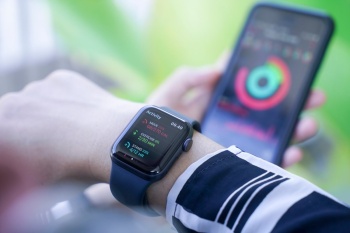
World Health Day: The most exciting digital health innovations in 2024
This World Health Day, we highlight some groundbreaking innovations happening in digital healthcare.

- World Health Day
- Innovation
- Digital Health
Digital technology has been transforming the healthcare landscape for many years, but with recent developments in technologies such as generative AI and wearables, the rate of innovation is set to increase.
Here, as we mark World Health Day 2024 on 7 April we’ve highlighted some of the most exciting examples of digital innovation happening across the digital healthcare spectrum.
AI in drug discovery and development
Using AI in drug discovery may mark the beginning of a transformative period in medical breakthroughs. The journey to bringing a new drug to market typically takes 12-15 years and costs about $2.5B, but with AI’s data processing capabilities, the cost and time of drug development could be dramatically reduced. AI can analyse huge swathes of data in days, a task that would take humans years, examining complex protein structures and evaluating potential target molecules.
There are still challenges to overcome to achieve widespread AI adoption, such as issues of trust, data quality and accessibility. Once these hurdles are overcome, there is potential to not only streamline and reduce the cost of drug discovery, but also widen access to new medications.
Using virtual reality to train medical professionals
The ability for medical professionals to train using Virtual Reality (VR) and Augmented Reality (AR) is setting a new standard in medical education. With pre-operation access to 3D renderings of hearts, eyes, knee joints, doctors and surgeons can practice doing a limitless number of surgeries to gain experience and refine their practice before operating in real life, which is particularly helpful in complex areas.
Following best practices for implementing AR and VR in healthcare can lead to fostering collaboration, building competence in handling stressful medical situations and enabling medical professionals to be better equipped to deliver the best patient care.
Using 3D printing for medical supplies and organs
Exciting research taking place into creating 3D-printed organs made from a patient's own tissues. If this turns out to be successful, it could ease the chronic shortage of organs available for transplant and make life-saving procedures much more affordable.
Additive manufacturing, which includes methods like 3D printing, is transforming healthcare delivery in a number of ways, for example in regions where it's tough to get medical supplies. The technology allows for the creation of essential items on demand, such as surgical tools to orthopaedic, dental implants, and even prosthetic limbs.

Wearable tech — more than just watches
The world of wearable tech has advanced drastically in recent years and now encompasses much more than just wrist-worn heart rate and exercise trackers. Today, there are wearable tech products on the market that can be worn on 18 separate body parts — from smart socks to support diabetes management, digital tattoos to monitor vital signs, and headbands to track your brain waves as you sleep.
67% of UK adults in a recent YouGov poll report having tracked their health via an app or device. As we become more health-conscious and engaged — and increasingly obsessive over our PBs — it doesn’t seem like the demand for these devices is going to slow down any time soon.
Advancing personalised medicine using digital twins
A digital twin is a virtual representation or simulation of a physical object, person process or system that contains all the data and characteristics required to mimic its real-world counterpart, including behaviour, performance and interactions.
Digital twin technology could revolutionise many areas of medicine in the coming years, allowing people to be diagnosed with an illness many years before actually having it, or to participate in a clinical trial without physically taking part. They could allow us to better predict physiological and sociological behaviours to apply more targeted treatments and interventions.
Leading health tech in 2024: AI, advanced research & machine learning
Healthcare technology companies are combining AI, machine learning and advanced research to develop innovative solutions that will improve care quality and industry efficiency. Just a few areas in which top solutions have been developed include fertility, cancer, and mental health, and the list keeps on going.
Many products warrant recognition and celebration, but to name a few, Kherion Medical Technologiesare developing tools to enhance precision and efficiency of breast cancer screenings, with tools specifically designed to address gaps in the speed and accuracy of a diagnosis. Another company, Unmind, has created a platform that’s helped over 2.5 million people in the workplace to manage their mental health.
My health, my right
The theme for this year’s World Health Day is ‘My health, my right’, which is about pushing for everyone, no matter where they are, to have access to the health services they need.
Digital has huge potential to widen access to healthcare and give people increased control over their own health. Although some of the technologies mentioned here are unlikely to be available at an accessible price point for many of us for a while, we’re excited about the scope of digital to advance innovation across the sector, drive down development and research costs and ultimately improve health outcomes for millions.
Want to know more about what we do?


Optimising the HCP portal registration process to improve access to valuable content
